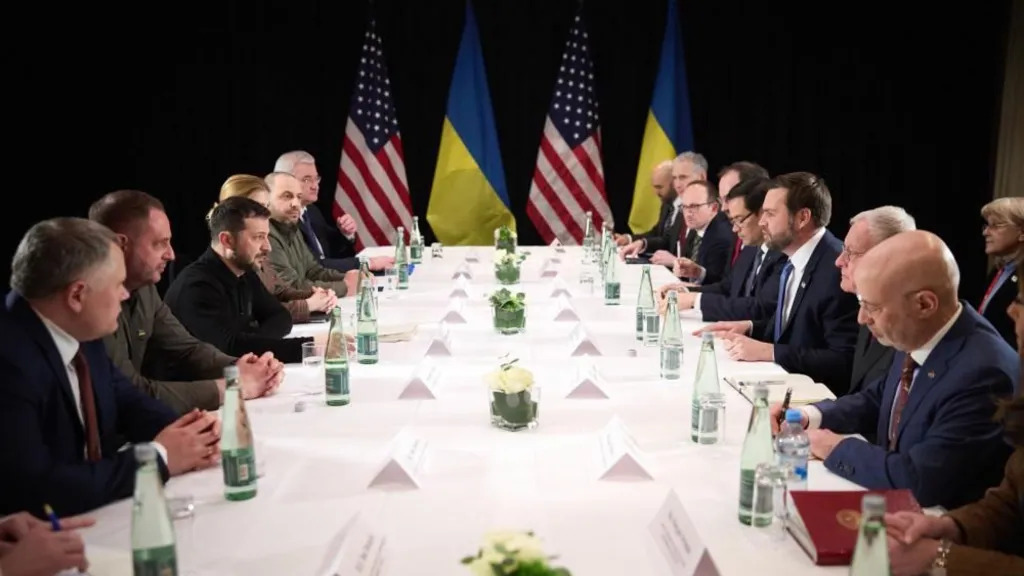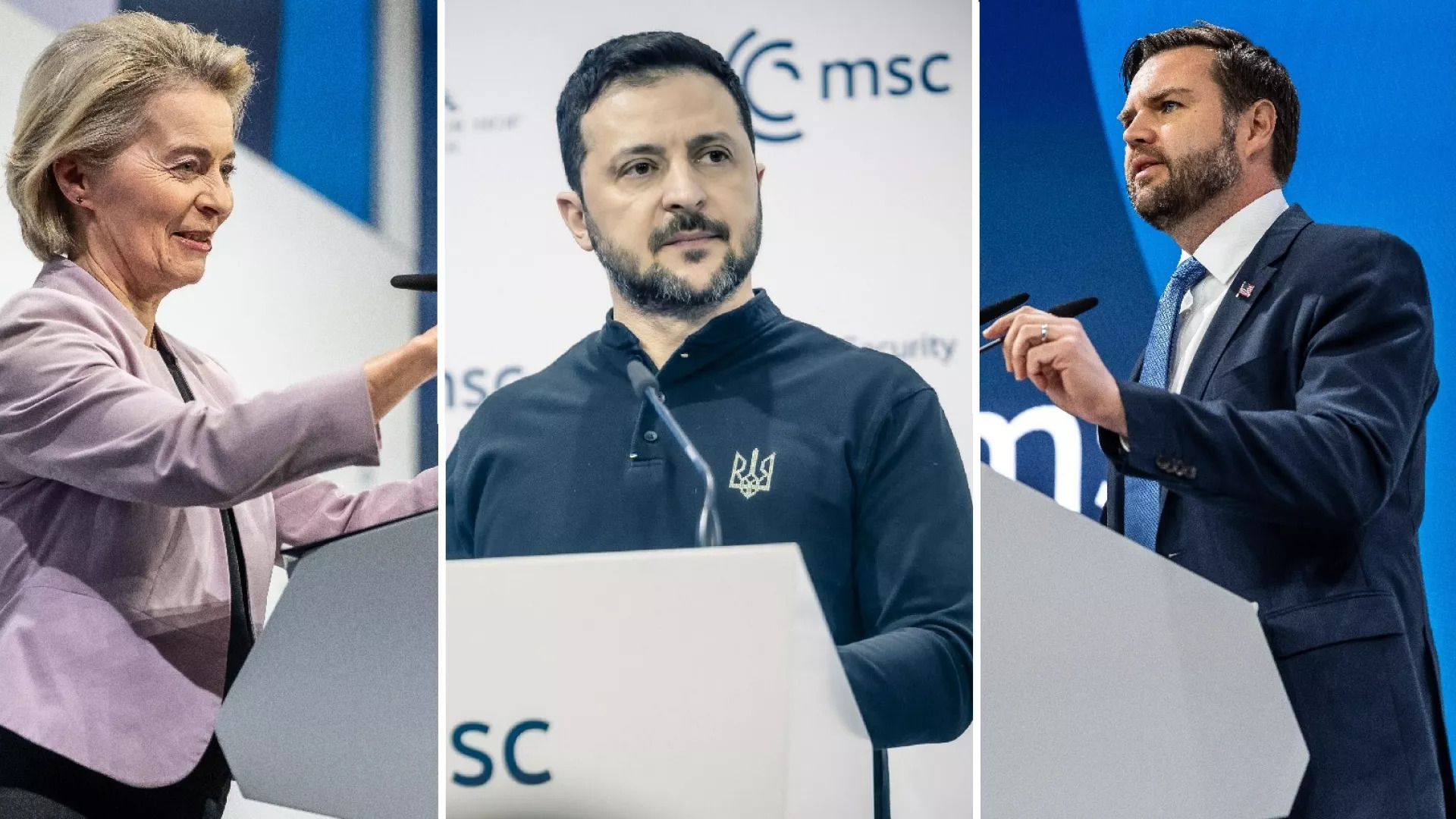
Ukraine's President Volodymyr Zelensky held a meeting with U.S. Vice President JD Vance in Munich - but did not play a part in U.S. talks with Russia the following week.
Over the course of three days in February, Europe underwent what can only be described as the most significant psychological shock since the end of the Cold War. This shock was triggered by several events: a lengthy phone call between U.S. President Donald Trump and Russian President Vladimir Putin, followed immediately by a condescending address by U.S. Defense Secretary Pete Hegseth to NATO members and Ukraine during his visit to Brussels and sarcastic remarks made by Vice President JD Vance to Europe at the 61st Munich Security Conference in Germany. I have dubbed this shock, which is of enormous historic proportions, the Munich Shock.
At the Munich conference, Europe’s emotions were on full display. The European elites, with their inherent self-assigned superiority, lost no time venting their frustrations to Vance and the U.S. congressional delegation in their fleeting two-day meeting. They accused the Trump administration of flouting the international order and pledged not to tolerate any policy of betrayal or appeasement.
Munich, the site of one of the most despicable acts in the runup to World War II, aptly reminds Europe of the consequences of standing idly by while the great powers contrived to carve up a small European country. The deed would only create an illusory and short-lived peace. Winston Churchill told Neville Chamberlain: You were given the choice between war and dishonor. You chose dishonor, and you will have war.
Understandably, Ukraine will not be kept out. After his meeting with U.S. Treasury Secretary Scott Bessent in Kyiv, and after talking with Trump on the phone, Zelenskyy raced to the Munich Security Conference, where he delivered a speech, met with a bipartisan U.S. congressional delegation and met with Vance and several European leaders. He even postponed his meeting with Vance so he could ask the United States to revise a mineral agreement — a draft that was rejected by Zelenskyy. He publicly explained that the terms would practically obligate Ukraine to give away half its mineral resources to the U.S. and lacked any security assurances for Ukraine.
Zelenskyy’s rejection of the peace agreement without Ukraine’s presence at the table was a political decision, as is his repudiation of the mineral agreement, neither of which is surprising. Since Trump claimed that Ukraine must have an election, Zelenskyy will undoubtedly defend to the hilt his legitimacy as a “wartime president.”
What is slightly surprising though, is Europe’s friendly astonishment. It has been a year since Trump claimed he could easily restore peace between Russia and Ukraine and made his attitude toward NATO crystal clear. Europe has long been taking preemptive measures, rebuilding its own military industry and overtaking the U.S. as the top supplier of weapons to Ukraine. Fair to say, it has made some strides towards both goals. So why does the EU appear so upset in front of the world?
Europe was likely shaken in three significant ways. First, it didn’t anticipate that Trump would extend an olive branch to Putin before peace talks had even started. Second, it was caught off guard by the new U.S. administration’s decision to engage in high-level talks with Russia without consulting either Ukraine or Europe. The peace road map was negotiated between the U.S. and Russia first, then presented to Ukraine and Europe as a fait accompli for their approval. Third, Europe was surprised that the Trump administration would elevate differences in transatlantic values to the level of a core contradictions. This has overshadowed regional security concerns as the central theme of Vice President Vance’s speech at the Munich Security Conference.
In a sense, Hegseth’s address at NATO headquarters and Vance’s speech at Munich are closely aligned. Together, they offer a clearer glimpse into the substance of Trump’s policies on Ukraine and Europe — revealing more details than just the call between Trump and Putin. Hegseth practically drew a red line on the Ukraine issue, calling it “unrealistic” to restore Ukraine’s borders to their pre-2014 status, or to pursue NATO membership, or to expect American boots on Ukrainian soil.
Meanwhile, Vance’s speech underscored the Trump administration's dismissive attitude toward Europe. In essence, he was signaling that Europe must embrace a Trump-style conservative agenda if it wishes to keep the transatlantic security pact alive.

Ukraine and Europe find themselves with few alternatives in the face of the ruthless realism of the Trump administration. They are retreating from the “fighting to the end” slogan to avoid ending up not just at the table but on the menu.
Ukraine now seeks only security guarantees. Over the past year, recognizing that NATO membership is out of reach, it has shifted tactics toward building an alternative security framework. This framework is supported by bilateral security treaties with European countries. As of July, Ukraine had signed agreements with nine European nations and as of June had concluded a regional joint security commitment with the EU.
However, Ukraine is keenly aware that without U.S. commitments and support, these guarantees are fragile and perhaps illusory. Thus, it continues to push for support from the Trump administration, seeing it as essential for meaningful security.
The European Union has fixed its core demand on “lasting peace.” Europe, especially Central and Eastern European countries, harbors a deep distrust of Russia. They believe that Russia would use an unjust peace to catch its breath and, within a few years, inevitably return to launch a new war against Europe. Europe reckons that lasting peace can only be achieved through deep engagement in peace talks and by collectively pressuring Russia to make concrete security commitments. Thus, it has explicitly rejected any “Munich Agreement 2.0” or “Yalta Agreement 2.0” in which major powers redraw spheres of influence behind closed doors. Europe now can hardly secure its own seat in any future Ukraine-Russia peace negotiation.
As the Munich conference concluded, French President Emmanuel Macron called for an emergency EU summit in Paris to address the U.S. policy shift. Some members said that Europe had finally awakened but not overnight. A gradual process has encompassed both awareness and action.
In fact, European awareness began on Feb. 24, 2022, and has since shown early signs of translating into action. This is evident in Macron’ s persistent calls for “strategic autonomy” and his efforts to create a European political community and a European rapid reaction force. Germany has also abandoned the liberal policies cultivated by Angela Merkel over a decade and has entered a period of turbulent and painful transition. Meanwhile, the EU has revised its decision-making rules and no longer requires consensus on everything.
The Munich Shock has propelled Europe’ s self-revolution into a new phase. It would be a game-changer, for example, if it capitalizes on the momentum from a political resolution of the Ukraine conflict to establish a European army. Such a force, a multinational coalition, would be deployed in the narrow buffer zone between Ukraine and Russia, with the Ukrainian military forming its backbone. Over time, it could have a profound impact on shaping a new European security architecture. At the Munich conference, Zelenskyy declared that if Ukraine is not allowed to join NATO, he would create a “new NATO” on Ukrainian soil.
As geopolitical rivalries intensify, European countries are inevitably set to increase their defense spending, which will weigh on economic recovery and further embolden the European far right. This development aligns with Trump’s expectations. His administration outlined the underlying logic of the new U.S. policy at its Munich debut: Europe must take greater responsibility for its own security because the United States is overstretched and preoccupied with countering China. What went unsaid is that if Europe can regain its autonomy and block Russia’s westward expansion, the U.S. will be more than happy and even offer assistance, including by suppressing international oil prices.
At Munich, discussions about a multipolar world were overshadowed by the Ukraine issue. The annual Munich Security Report, released ahead the conference, set the theme as “multipolarization.” Europeans have finally come to terms with the undeniable decline of U.S. hegemony. They are increasingly worried about becoming casualties of the great upheaval in a “poleless” world and fear they will have no place in the future global order.
For years, Europe has been perceived by international public opinion as fragmented, weak, in decline, emotional and all talk but no action. This time, even if the humiliating withdrawal by the U.S. fails to prompt Europe to fully wake up quickly, Europe will lose not only its seat at the Ukraine-Russia peace talks but also its place in the first tier of the future multipolar world. Time is running out for Europe, and it has few cards to play. Moreover, its stance will continue to waver amid internal divisions.
As for the trajectory of Ukraine, the hard-line tactics employed by Trump and his team reveal that they lack a concrete peace plan and remain mired in a stalemate. However, the shift in the U.S. stance has provided Russia with a significant boost in morale. In recent days, Moscow has exuded a mood of optimism, a newfound confidence that is likely to translate into an even more uncompromising and hard-line approach on the battlefield, regardless of the cost. To reclaim its negotiating leverage, Kiev has no choice but to escalate its military commitment. It will need to tenaciously hold the lines in Kursk and Donetsk and launch more long-range strikes against targets within Russia.
The Ukraine conflict shows no signs of subsiding. Instead, a significant escalation appears imminent. Even if peace talks do commence, they are likely to proceed concurrently with ongoing fighting. Ultimately, what cannot be resolved at the negotiating table will have to be settled on the battlefield.
Amid the uncertainties that still shroud the situation, one thing is certain: neither Russia nor Ukraine will be able to achieve everything they desire or reject everything they oppose. The same holds true for the United States and Europe.